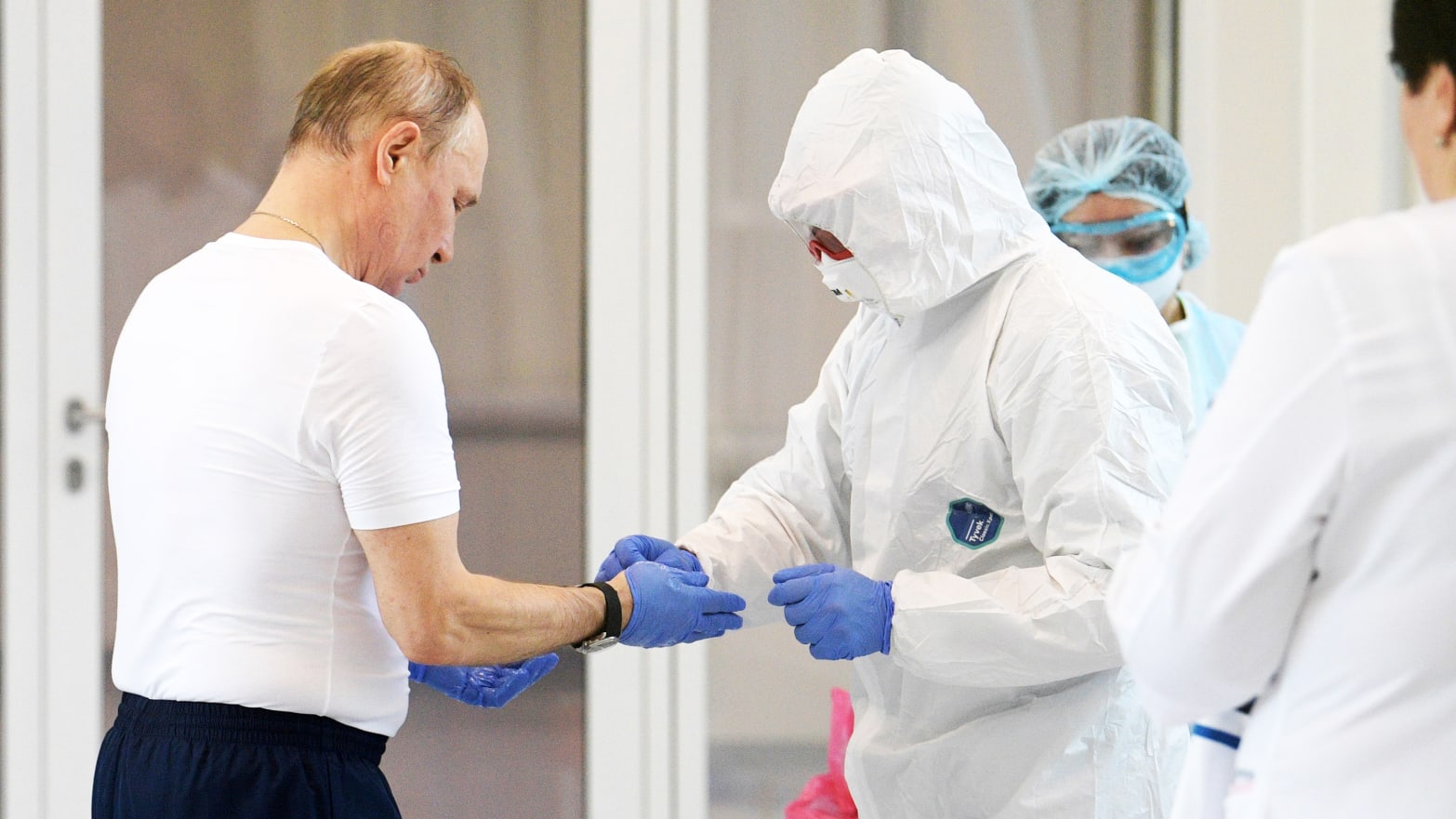Usually reserved guests on Russian state television are no longer hiding their exasperation—and very likely their fear—as their country is forced to face the tidal wave of disease and despair that is the COVID-19 pandemic. And the focus of much of their anger? Kremlin grandstanding with shipments of supplies to the United States in so-far forlorn hopes that the PR stunt will encourage the Americans to lift sanctions.
Monday, on the popular Russian state TV show 60 Minutes, lawmaker Aleksey Zhuravlyov, deputy of the State Duma, practically unraveled on live TV. When the host, Evgeny Popov, brought up Russia’s “humanitarian aid” to the U.S., Zhuravlyov let it rip, pouring out his frustrations in a bombastic fit of fury.
Zhuravlyov showered the surprised host with a blustering condemnation of what he perceived to be an act of aiding Russia’s enemies. “Our own doctors don’t have enough of what they need—but sure, let’s send some humanitarian aid over there!”
Zhuravlyov also questioned why the United States paid for half of the so-called aid, with the other half sponsored by the Russian Direct Investment Fund (RDIF), which he angrily described as “the Fund of Crooked Investments.” The flustered lawmaker loudly exclaimed that instead of financing the aid to the United States, RDIF should have covered the cost of transporting Russian citizens stuck abroad back to their homeland. Zhuravlyov screamed out in disbelief: “Why are they helping the Americans?”
The host looked stunned, trying in vain to regain control of his show, but the unruly lawmaker continued, angrily yelling over his head: “We shouldn’t be doing that! We don’t even have enough for ourselves!” He added: “We should only be helping those who are helping us!”
Popov turned to other panelists, asking whether it was a good thing for Russia to send aid to other countries. Undeterred and unhinged, Zhuravlyov kept raging on. He shrieked: “Help yourself first, you poor thing!”
Political analyst Sergei Markov attempted to argue that after the U.S. is past the apex of coronavirus infections, it would reciprocate and send ventilators and medical supplies back to Russia. Zhuravlyov remained unpersuaded and yelled back: “Dream on! All you’ll get in return from them is more sanctions and a kick in the ass.”
Meanwhile, Popov’s wife, Olga Skabeeva, hosted other segments of 60 Minutes, and while broaching the topic of Russia’s coronavirus aid to the United States, she too faced impassioned pushback from angry panelists.
She bemoaned Donald Trump’s failure to reciprocate the Kremlin’s gesture: “Coronavirus forced U.S. President Trump to overlook the customary rivalry with the Russian Federation. Trump practically removed the sanctions—he wanted to do it—but changed his mind at the last moment.” Skabeeva said that welcoming the aid from the Russian Federation “with pleasure” revealed what the American president “was made of,” hinting at his pro-Russian leanings.
For the record, the Kremlin claimed that Russia provided coronavirus aid to the United States for purely humanitarian reasons, expecting nothing in return. During an official briefing last week, Maria Zakharova, the Russian foreign ministry spokeswoman, complained about “the mechanisms of propaganda, information warfare” allegedly used by Western media “to diminish the significance of these humanitarian actions or simply distort them.” Zakharova alleged that Russia’s coronavirus assistance toward NATO countries was “completely sincere,” with no ulterior motives.
One of the most highly coveted items on President Vladimir Putin’s wishlist is the lifting of U.S. sanctions, which were imposed after the annexation of Crimea, covert military activities in Ukraine, the downing of the Malaysia Airlines Flight 17, the attempted poisoning of Sergei Skripal, and Russian interference in the U.S. elections.
But instead of lifting the sanctions, the United States extended them on the same day Trump called Putin and welcomed the coronavirus aid from Russia. Given that timing, no matter how well the Kremlin agitprop works with the American leader’s public expressions of warmth and camaraderie, the concrete result isn’t selling so well back at home.
Over the years, 60 Minutes has promoted the notion that thanks to Trump sanctions relief is within reach and the Kremlin will be able to extract it without making any concessions. Russian state-media pundits and experts argued that the fight against the coronavirus presented a unique opportunity for another reset between the United States and Russia.
Putin called for the immediate removal of all sanctions at the extraordinary virtual G-20 summit on March 26. His spokesman Dmitry Peskov said that the Kremlin’s premise in dealing with other countries is that “everyone is in the same boat in the fight against the coronavirus.”
Sharing his outlook on 60 Minutes, political analyst Mikhail Markelov wasn’t quite as magnanimous. “They say we’re all in the same boat,” he argued bitterly. “We’re not ‘in the same boat.’ We’re all aboard the Titanic.”
The Kremlin is sending abroad the very same supplies Russia’s own hospitals are sorely lacking, for the sake of posturing and propaganda, and Markelov was flustered and angry that after the United States accepted Russian aid, the immediate removal of sanctions didn’t follow. He described the Trump administration’s lack of reciprocity as “a real slap in the face.”
During the same program, Zakhar Prilepin, former deputy commander of the military unit that fought against the Ukrainian government under the banner of the “Donetsk People’s Republic,” came to Putin’s defense. He pointed out that the West is yet to forgive Russia for its annexation of Crimea and military activities in Ukraine, but, referring to Putin as “our emperor,” Prilepin praised him for thinking further ahead than the immediate moment. “Right now, Trump can’t do it, it’s understood, he’s under pressure. He’d be accused of selling out to the tyrant. We need to send a second planeload, then he’ll remove the sanctions. We’ll get much more out of it that way,” he argued.
Skabeeva replied facetiously: “And after the third planeload, we’ll be hugging and kissing.”
While the Russian state media are none too happy about the U.S. government’s continued stance on sanctions, they try to find consolation in America’s grim coronavirus meltdown. Russia’s own statistics are highly suspect, but they are contrasted with the number of infections and deaths now being recorded in the United States.
State TV’s popular Sunday show News of the Week called Russia’s coronavirus numbers “incomparably better” than those in the United States. The latest statistics listed the number of coronavirus infections in Russia as 7,497 cases, with 58 deaths.
State media praised Russia’s coronavirus response as strong and effective—including roadblocks, draconian quarantine measures, the streets being washed with disinfectants, and the temperatures of commercial truck drivers being taken before allowing them to travel between different regions of the country.
By contrast, Trump’s handling of the crisis is seen as weak and indecisive. The Moscow-based daily newspaper Moskovsky Komsomolets concluded that the United States “collapsed in the face of the coronavirus” and described Trump’s followers as simple-minded fools for going along with the way he downplayed the deadly pandemic. (Putin’s government did the same and worse in hopes it could salvage a referendum this month making him in effect president for life, but eventually it found the extent of the crisis too big to obscure entirely.)
Vladimir Soloviev, who hosts an eponymous Sunday evening show on the state-TV channel Rossiya-1, mocked the United States as a country with an enormous defense budget that doesn’t have enough face masks, toilet paper, or ammunition. Soloviev said Donald Trump’s leadership was severely undermining NATO alliances and opined that the coronavirus might provoke the beginning of the next geopolitical war.
Soloviev also attempted to portray the coronavirus as a manmade tool of bio-warfare, in furtherance of the Kremlin’s time-honored tradition of identifying an external enemy in order to avoid internal criticism. “This is not a conspiracy theory, this is the theory of war,” he argued. Pro-Kremlin experts dutifully nodded along.
To further his agenda, Soloviev brought on political scientist Sergei Kurginyan, whose elaborate conspiracy theory caused even the experienced propagandists gathered in Soloviev’s studio to stop nodding and blankly stare in disbelief. They looked tense and uncomfortable, as Kurginyan unwrapped a bizarre hypothesis alleging that the coronavirus pandemic was launched by “radical evangelicals,” led by Vice President Mike Pence and aided by Bill Gates—in a bid to replace Donald Trump with his VP.
Kurginyan asked and answered his own questions: “Whose ratings keep growing? Those of Vice President Pence! Who surpassed Trump in his ratings? Pence!” He bellowed and gesticulated, attempting to make eye contact with other panelists, while they blankly stared back and probably wished they weren’t there.
The very fabric of the Kremlin’s propaganda seems to be fraying at the seams, as even the most devoted talking heads are losing the plot—or falling apart—in the face of the deadly pandemic.

